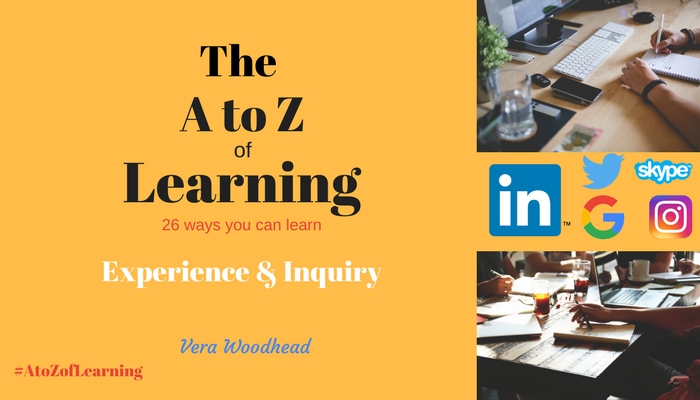‘What can you do?’ asked Mr Smith (not his real name!) in a somewhat riled manner. His dull blue eyes stared across the table. I was in the early days of my consulting practice and at a business networking meeting explaining what I do, how I work, add value, outcomes…
‘ I’ve been running my business for 14 years’, he interrupted, ‘you can’t tell me anything I don’t already know ‘, he continued.
It didn’t matter what I said. Mr Smith wasn’t listening. I never worked with Mr Smith who was doing the same thing for 14 years.
Experience is a great thing. Doing the same thing in a world that is constantly changing isn’t.
Unless you adapt and move with the times, you’ll get left behind.
Mr Smith did.
7 months later he was no longer in business.
Learning through experience is probably one of the most common ways of learning. Through doing, we gain understanding and develop new skills.
Can you remember doing something new for the first time? You may gathered information, chatted with others on what they did and how, before diving in.
You probably didn’t get succeed first time. Or second. Or third…
You probably learnt through trial and error – by finding out what worked and what didn’t
You probably got frustrated and chastised yourself but the little glimmers of success spurred you on.
When we are learning through doing, we are constantly trying to make sense of how our actions are impacting on what is happening, evaluating, testing out, building knowledge, trialling until we get it right/ get results. It is a process of Inquiry and discovery.
Curiosity plays a important role in Inquiry. Can you remember being curious as a child. Always asking questions? Wanting to know more?
As a child I was fascinated by Enid Blyton’s Five Find-Outers (and Dog) series. Did you read them? The children were always finding out things to solve crimes in the village of Peterswood.
When children enter school, inquiry and discovery is often pushed aside to learn what is set in the curriculum and to pass exams.
The journey through life is full of Inquiry – if we choose to approach it this way.
You walk down the street and something makes you look up. You see a statue that you have not noticed before. What is it, why is it there, what does it represent …?
You are curious. You Goggle it, you take a picture and talk about it with your friends, family, colleagues, on Twitter. …you are finding out, doing research, constructing your own knowledge and understanding… you are sense making
Your connections, communities, family, friends add their own perspectives – together you are engaging in social learning, sharing and building a community of knowledge…wow, isn’t learning fabulous.
You are scrolling down your Twitter/LinkedIn feed and something catches your interest. You pause, you click on the link, you watched a video – you get a new take on something old, your perspective has changed. Next time you do that something, you might just do it differently. You have put learning into action.
Inquiry is a much required necessity if you are to stay abreast of the changes that are happening- for example in the use of technology which is changing the way we work, learn, shop, travel, bank…
Learning through experience is highly personalised – you get there doing it your own individual way.
You could continue doing it your way for years to come – doing the same thing day in day out. Would you become an expert?
In the 1990s Ericsson et al proposed that expert performance comes not from innate talent but from deliberate practice over a minimum of 10 years. This is what separates the novice from the expert.
A concept that Malcolm Gladwell took further in his book, Outliers, purporting that attaining a 10,000 hours of practice results in becoming an expert .
Macnamara et al (2014) in their meta analysis concluded that whilst the amount of deliberate practice is an important predictor of individual differences in performance, analyses revealed that the strength of the relationship between deliberate practice and performance varied by domain. In terms of percentage of variance in performance explained, the effect of deliberate practice was strong for games (26%), music (21%), sports (18%), and much weaker for education (4%) and professions (< 1% and not statistically significant). Deliberate practice seems less well defined in the latter 2 domains.
Experience on its own is not enough. It will not lead to mastery.
Experience together with:
- Continued inquiry and learning
- Reflection
- Feedback loop
Makes a greater difference and will get you there quicker and enable you to be more effective in a rapidly changing world.
How do you maintain your curiosity? How are you engaging in Inquiry? Perhaps you are an expert – what makes you one? Love to hear your views
Image via the Enid Blyton Society
Read the rest of the #AtoZofLearning series:
Action Learning – what it is, benefits, how it works
Blogs and Blogging – why read, where to find them, how to start blogging
Coaching – why use, how to find the right coach for you, questions to ask your coach and yourself
9 reasons to engage in group discussions and 10 ways to generate good ones
I’m an executive coach, leadership facilitator and learning & development consultant working with leaders to develop the skills and behaviours to inspire performance, drive results and achieve career success. Within organisations, I help to facilitate better conversations, designing learning interventions which deliver practical and lasting solutions aligned to business strategy and goals.
If you enjoyed reading this post, please follow, like, comment, share and connect with me @verawoodhead
Discover more from Vera Woodhead
Subscribe to get the latest posts sent to your email.

